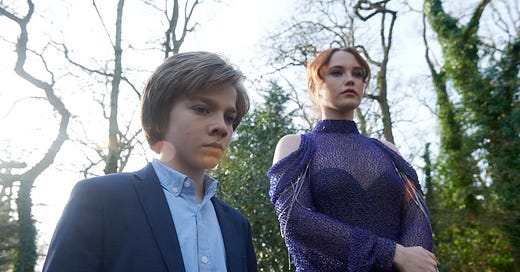Last night I watched Daddy’s Head, a horror movie written and directed by Benjamin Barfoot. I thought the film was superbly done and intriguing on multiple levels, and I highly recommend it. Daddy’s Head brought to mind another horror film I saw a month earlier, hewed from similar materials, the less successful Oddity (Damian McCarthy). In both films a loved one has recently and tragically died, a loss that drives the plot (as I mentioned elsewhere horror movies like to start with death not only to evoke mood, but also to lay down their consequentiality baselines). In both films isolation matters quite a lot to the characters and the story — which is to say, without spatial and psychological isolation neither film would fly.
But the films diverge in how they deal with the isolation that their plot requires, diverge in ways that strike me as important for fiction writers to reflect on. Daddy’s Head’s protagonist is isolated because of her grief and because her ex’s massive estate is in the middle of nowhere — yet in spite of all that soledad, the protagonist’s relational world and the film’s larger diegetic world are persistently represented. Because of a lot of spoilerish shit I won’t get into, the protagonist (a fantastic Julia Brown) has truck with firefighters, child welfare authorities, psychologists, an old friend, and a nurse — and all that contact doesn't make our hero seem less lonely — quite the opposite — all that congress serves to emphasize our hero’s isolation.
Camus had the right of it: loneliness is the feeling of being alone in a crowd. By making our protagonist alone in a crowd (a crowd that is itself not alone) the filmmakers get a magnificent storytelling two-fer — a deeply isolated narrator and an active diegetic world that seems utterly unaware of the tragedy that afflicts the character, a living world that helps sell itself and the characters’ isolation and, by establishing its reality bona fides, the fantastic elements that are about to unfold. Good writers understand that stories are capacious enough to contain both the dreadful desolation of their protagonists and a world that is not itself dreadful or desolate. In fact, for a narrative world to feel like a world, it must be, like a story, capacious.
Oddity’s psychic protagonist has also endured a terrible loss, the brutal murder of her twin sister, but rather than depict how the protagonist’s grief makes her alone in her crowd, Oddity’s filmmakers cut her off from her crowd completely; we are never shown the relationship web that would make the protagonist a convincing compelling character (or would explain why she does what she does, or what such a choice will mean for her character). By literalizing her grief-fueled isolation — the character feels alone so we will make her alone, dammit — Oddity’s filmmakers render her grief and her loneliness abstract, less powerful than if they had given her a “crowd”.
Same goes for the movie’s diegetic world. Oddity takes place in two main spaces — a country house and psychiatric hospital. Both spaces are meant to be isolated, but because the film (again) literalizes the isolation and seals both spaces off from anything that might be called the normal world, both places feel less real than if the larger diegetic world had intruded more regularly into them. Such intrusions could have dramatized the isolation and sold us the large world.
Oddity’s narrative choices underscore the danger of Fallacy of Imitative Form thinking. (Fallacy of Imitative Form is when you have a boring character in your story, and therefore you write them boringly.) In Oddity it’s as though the entire diegetic universe knows the script — our hero is emotionally isolated — and contrives to fulfill its demands. Contrived is truly how it all reads.
Quite the opposite happens in Daddy’s Head. The characters and their plight might be impossibly important, but the diegetic world moves along oblivious, as though it never got the script — world and character/plight are connected, sure, but also independent, and this makes the characters’ isolation and the supernatural madness that plagues them intuitively and cognitively more believable, more convincing, and more satisfying overall.
As anyone who watches Daddy’s Head and Oddity back to back will confirm: Fallacy of Imitative Form is the story killer.
FOIF kills because it’s so thickly literal and because it distrusts the very capaciousness that make stories awesome.
Please avoid at all costs. Because as Oddity shows, if you FOIF around you will find out.





Very interesting to think about. And I wonder if it applies more generally: for a character’s psychology/situation to show up most sharply they need to be in situations which run counter to it, rather than aligning with it. I can feel an Itch of Writing post coming on…
Re-upping. My sole Substack that I'm paying for. Trying to decide on Meghan O'Rourke. But that's it!